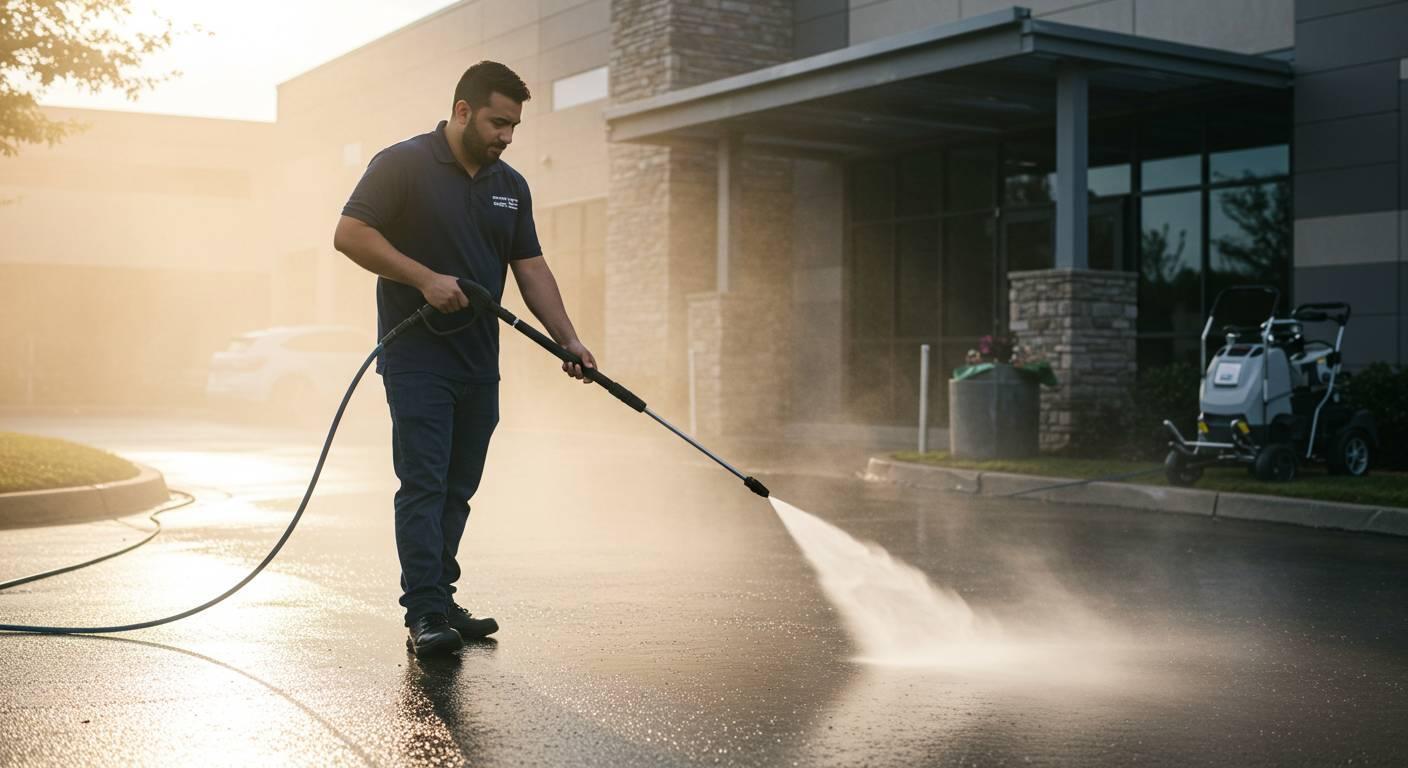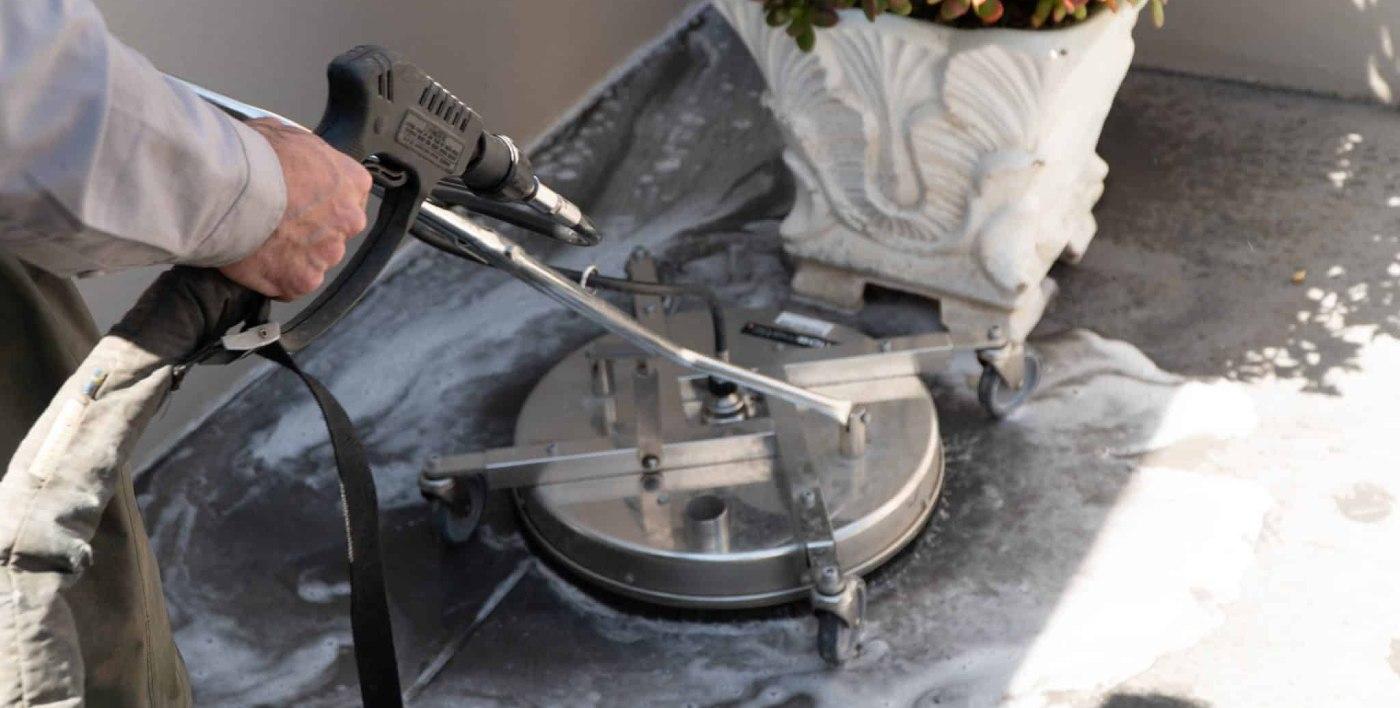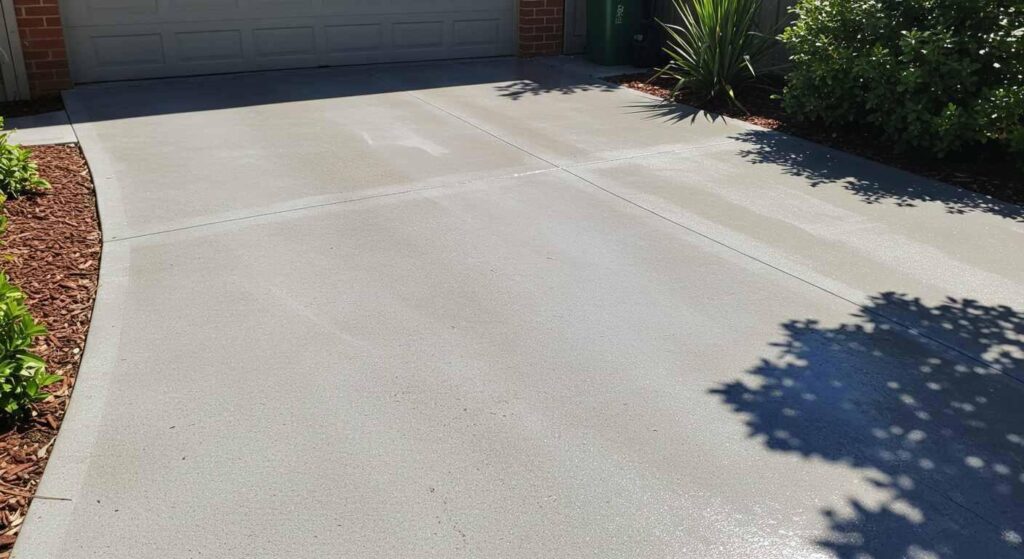Ever looked at your driveway and thought, “How did this get so grimy?” We hear it all the time.
Greasy marks, mould spots, and years of neglect can make even a stunning property seem tired and forgotten.
But with so many products promising the ‘perfect’ clean, it’s hard to know what actually works.
Some can eat into your concrete, while others just smear the dirt around, which is both frustrating and time-wasting.
That’s where we come in to make things easier for hardworking homeowners and property pros across Melbourne. At Refined Exterior Cleaning, we match the right chemical and pressure to your needs-safely, efficiently, and with care.
Understanding Concrete Stains
Concrete takes a beating-rain, oil leaks, muddy boots, and even bird mess. Over time, all this grime builds up.
Oil stains from cars, rusty spots from furniture, mould hiding in damp corners, and paint spills all tell a story. Add daily dust, dirt layers, and mineral residue from water runoff. These leave your surface looking tired and darkened.
Common types of stains
We’ve seen it all-grease spots in garages, rust from old barrels, flaking paint on patios, even slippery mildew. Dirt and grime tend to mingle with these, creating layers that need more than just a mop.
Cause and effect of not removing stains
Ignoring stains can crack the surface over time, cause discolouration, and make walkways unsafe. It chips away at your curb appeal, especially in high-traffic areas. Even freshly painted walls don’t stand out when driveways look tired.
Choosing the Right Cleaning Agent
Grabbing just any cleaner off the shelf won’t cut it. Each stain needs its match, and bad pairings can cause damage.
Match the cleaner to the stain type
Oil stains need degreasers. Mould asks for cleaners that kill spores. Surface smudges disappear with light agents; deeper ones demand stronger options. Choosing incorrectly can lock stains in further or destroy coloured finishes.
Efficiency and suitability
Fast results matter, but not at the cost of safety. Some cleaners can harm pets, garden beds, or even your concrete. We always factor in surface type and chemistry before any spray hits the slab.
Most Common and Effective Chemicals
Our years in Melbourne have taught us which chemicals get it done without causing future regrets.
Vinegar and Baking Soda
Perfect for indoor areas or light outdoor smudges. Baking soda lifts mild grease, while vinegar clears light residues. Add elbow grease with a brush, and they’re solid DIY picks for minor messes.
Bleach
For mould and mildew, bleach helps tackle patches quickly. Always dilute it and wear protective gear. Never let it run off into lawns or drains-it’s effective, but needs careful handling.
Hydrochloric Acid
When stubborn concrete stains won’t budge, this heavy-duty acid goes deep. Excellent for etching and resetting, but far from beginner-friendly. We wear full gear and prep the surrounding areas before even opening the bottle.
Miteq Cleaners and Paint Strippers
These shine in commercial settings-car parks, industrial floors, or layered paint jobs. They penetrate stacked grime and remove layers fast. We use them selectively for thick build-up and always test first.
Crete-Off
Great post-construction for removing dried concrete from tools, vehicles, or surfaces. It softens cement bonds without harming the surroundings, making it super helpful during renovations or major cleaning projects.
Safe and Eco-Friendly Cleaning Options
We care about your gardens, pets, and air quality. You can get results without harsh side effects.
Natural DIY alternatives
Blending baking soda, castile soap, and vinegar works wonders for safe, everyday use. These mixtures don’t pollute soil or pose risks to animals and are gentle on paths and patios.
Biodegradable commercial products
Many of our professional tools use pet-safe, eco-conscious formulas. They break down oils and mould while remaining kind to the planet. A smart pick for regular surface maintenance without the harsh aftermath.
How to Properly Use Cleaning Chemicals
Using the right chemical is only half the battle; the control application method makes or breaks the result.
Basic application techniques
Some stains vanish quickly when scrubbed, while others respond better to soaking and rinsing. We measure our mix ratios specifically for each stain and its depth; no guesswork allowed.
Essential safety guidelines
Gloves, goggles, masks-every job gets complete prep. We ventilate enclosed spaces and store chemicals far from heat or water contact. Protection always comes first.
Rinsing and neutralising
After chemicals, a clean water rinse clears residue. Where needed, we use neutralisers to bring the pH back to safe levels so concrete won’t soften or corrode later on.
Cleaning Concrete with Pressure Washers
Pressure washing isn’t just blasting water-it’s aligning the right force with the right chemical base.
Combining pressure washers with chemicals
Driveways hold years of oil. Garages gather thick dust layers. Pairing degreasers with water pressure lifts shadowy marks and old grime fast, restoring lighter shades beneath.
Choosing pressure-washing-specific products
Pressure can wear coloured or sealed concrete thin. We test products for toughness, ensuring they’re also non-corrosive and safe on decorative finishes. No flaking allowed.

Post-Cleaning Care and Surface Maintenance
Cleaning ends with protection. If you want long-term results, sealing and maintenance become your best mates.
Applying sealers
A good sealer makes future stains less clingy. Whether you prefer a satin or shiny finish, sealers help prevent moisture from bouncing back and keep patches from setting in again.
Routine maintenance tips
Light rinses every few weeks and swift spot cleaning stop weeds and dirt from digging deep. We reapply protective coatings every couple of years to lock in your cleaner look.
When to Choose Professional Cleaning?
Sometimes the mess calls for extra muscle. That’s where we step in with training, tools, and care.
Signs you need expert help
If your surface has aged stains, painted sections, or deep mould, DIY won’t cut it. Our team assesses every square metre before spraying anything.
Benefits of hiring professionals
We’re not guessing-we use certified techniques, selected chemicals, and pro-grade machines. You’ll get faster, safer results without risking your concrete’s look or strength.
That Stubborn Stain Has Met Its Match
There comes a point when scrubbing just won’t cut it-and the mess mocks every effort you make. That moment calls for something more substantial, more innovative, and built to do what elbow grease can’t.
The final call? Choose a cleaner that cuts deep, breaks down grime fast, and won’t damage your surface. It should fight tough build-up without harming plants, pets, or your driveway’s finish.
At Refined Exterior Cleaning, we use proven, eco-safe solutions that tackle tough stains without damage. Let us bring the shine back-book your professional concrete clean today.

Frequently Asked Questions
Is it better to use vinegar or bleach on concrete?
Vinegar works for general dirt or water stains. Bleach is better for mould but needs caution and proper dilution.
What do professionals use to clean concrete?
We use degreasers, biodegradable surfactants, and pressure washers tailored to your stains, surface, and safety needs.
What is the most potent chemical for stained concrete?
Hydrochloric acid is a potent and fast-acting solution for stubborn patches. It’s strictly handled with care and protective gear.
How to clean concrete quickly and safely at home?
Start with sweeping, then apply vinegar or baking soda to dirty spots. Scrub, rinse thoroughly, and let dry.
Can I use dish detergent or soap-based degreasers?
Yes, for light grease or fresh spills. They won’t harm concrete, but usually won’t reach embedded stains.


